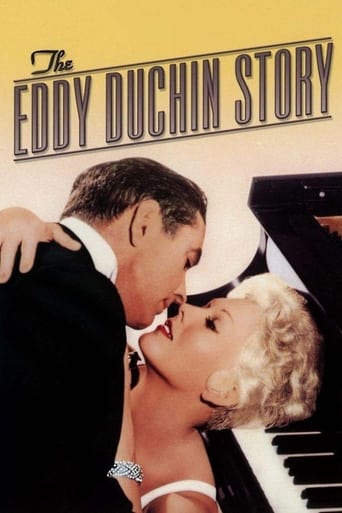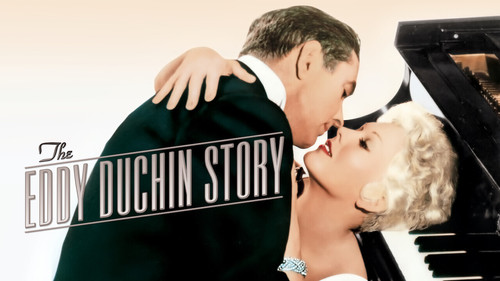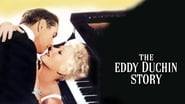rickdumesnil-55203
everything is cliché. soap opera style. i am the world strongest Tyrone power fan and although his acting was fine in this dull movie i wish he hadn't made it, the 2 leading ladies in my opinion are very so so looking especially that SHAW LADY not too gorgeous. James whitmore did a swell job but my favourite scene was with the native boy at the piano, he had just the right gestures and looks to make the scene credible, so far i think it is the worst movie Tyrone power ever made and I'm in awe of this actor. the make up artist did not help out his image either yet poor man he would die 2 years later, not an extremely bad film.....but a good soap opera
Claudio Carvalho
In the late 20's, the talkative newly graduated in pharmacy and aspirant piano player Eddy Duchin (Tyrone Power) comes from Boston to New York expecting to play with the orchestra of Leo Reisman (Larry Keating) at fancy New York's Central Park Casino. However he had misunderstood the invitation of the maestro and while leaving the place, he meets the wealthy socialite Marjorie Oelrichs (Kim Novak) that asks Leo Reisman to give a chance to Eddy. He plays in the intermission and becomes a successful piano showman. Two years later, Marjorie and Eddy get married and in the Christmas, Marjorie has a baby, Peter, but she dies after the delivery. Eddy rejects Peter blaming him for the death of Marjorie and only five years later he meets his son. With the World War II, Eddy Duchin breaks up his band and enlists to fight in the war. With the end of the war, Eddy returns to New York with the intention of getting closer to Peter but he sees the boy connected to his friend Chiquita (Victoria Shaw). When Eddy discovers that he has a terminal disease, he proposes Chiquita and they get married. When we see the biography of a personality by Hollywood, we are never sure that it is a true story or a fairy tale created by the cinema industry. Despite of that, the melodramatic "The Eddy Duchin Story" is a nice story of a man's life surrounded by music, beautiful ladies and tragedies. The forty-two year-old Tyrone Power has good performance and he really seems to be playing the piano, but it is funny to see him in the role of a newly graduated man. Kim Novak shines with her beauty, elegance and her sweet voice. Victoria Shaw is also gorgeous. The cinematography and the music score are awesome and deserved the nomination to the Oscar. My vote is seven.Title (Brazil): "Melodia Immortal" ("Immortal Melody")
tedg
Wow, what a mix of bad and good. The good is the music and the amazing period shots of New York. The bad... well just about anything else; its all rather poorly done. The script is particularly offensive; more about that in a moment. The acting is that goofy type which is unnatural, but not quite the unnatural stage style, more of a "read to the camera" style. Novak is pretty, but moves gracelessly.The story they have chosen to tell is a simple one: we learn to love a man through his ambition, gains, losses, sorrow and regaining of humanity after the war. This is about America after the war, not some pianist. Then sorrow strikes again and he handles it so wonderfully you applaud while crying. At least that's the goal and it probably worked for most viewers when this was new and America was trying to cope with post war loss.Something closer to the real story would have made a killer movie. Duchin was made famous by his recording that was the first use of the F-work in that medium. His first wife did die, but he was hardly grief-stricken — a famous womanizer. He did leave his boy with Averill Harriman's wife when he went to war. But that was because he was sleeping with her, while her husband was off in England sleeping (and finally marrying) another man's wife. The son of Winston Churchill in fact, so Harriman hardly cared about his wife's affair with a New York celebrity.Harriman was an amazing character through the period of this story. He, Dulles and Marshall shaped the world after the war in a liberal mold, essentially reforming Europe as a unit and building NATO, which for many decades was a very good thing. His presence through this movie as sort of an avuncular figure would be like having John Kennedy as a butler. The loss of the power-as-sex game and music-as-power thrust sort of waters down the whole thing.Why do I care? Because Harriman was particularly concerned about rebuilding France, a country that had humiliated itself and had no means to rebuild. It was, as now, an agricultural economy and Harriman couldn't see Americans subsidizing French farmers for decades. So he (his staff, yes Democrats) came up with the ideas of romanticizing Paris and Rome. Make them romantic cities that tourists would visit. They surely were not before the war. Paris had had its day as a center of art but never ever of romance.The plan was pulled off flawlessly, primarily through subsidies to Hollywood to make films that portrayed Paris romantically. Many of those films were from the same period of this film, an extreme irony. Extreme, you know.Harriman's first wife, the one playing with Duchin, had cheated on and left her first husband as well, an extremely wealthy fellow who just happened to be the financier of Technicolor which we find our self enjoying in this very film.Oh well, there is the music, How can you fault any film that starts with Chopin?Ted's Evaluation -- 1 of 3: You can find something better to do with this part of your life.
Neil Doyle
TYRONE POWER does a remarkably convincing job at the keyboard and the camera seems to linger on his dexterity at the piano (on a dummy keyboard, of course) while the magic of Carmen Cavallaro takes over on the soundtrack. He's excellent as the brash and overly eager young piano player who eventually makes bigtime as a popular pianist, marries and loses his sweetheart, KIM NOVAK, with whom he has a young son who at first resents him after Power's desertion, then reunites before Duchin's untimely death from leukemia. That's the plot, in a nutshell, but it's the sparkling music that counts.The richly textured Technicolor photography of Manhattan and its settings evoke the time and period perfectly. I found KIM NOVAK's performance artificial and disturbingly unreal--as though she were affecting a series of poses--while Power is completely natural and appealing opposite her. Novak's performance here is a far cry from her work as Madge in PICNIC. The mood of the film becomes somber after her death and Power's decision to leave the country on tour, leaving his baby son behind. The conflict between Duchin and his son is what has to be resolved before the story ends.The handsome production values are all enhanced by the constant use of Duchin's music, either in the background or with him at the keyboard and these qualities make it one of the most enjoyable musical biographies I've seen in a long time.The film won four Oscar nominations and Power deserved to be included, but was not.





